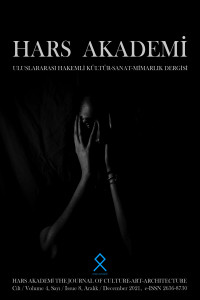Araştırma Makalesi
Yıl 2021,
Cilt: 4 Sayı: 8, 539 - 555, 31.12.2021
Öz
Türk şiirinin sürgün çehrelerinden birisi de Cemal Süreya’dır. Şairin bu yönü, uzun yıllar dikkatlerden kaçtı ya da kaçırıldı. Fakat son yıllarda Türkiye’de konuşulmayan pek çok meselenin konuşulmaya başlanması ile şairin bu yönüne dair söylenenlerin, yazılanların sayısı da arttı. Sanatçının şiirinin öne çıkan nitelikleri olan erotizm, lirizm ve aşk/kadın tutkusuna artık sürgün anlatısını da dâhil etmeliyiz. Hatta sürgün anlatısının da temelde bu üç niteliğin besleyicisi olduğunu söylemeliyiz.
Şairin ruhsal dünyasına etki eden sürgünlüğü annenin yitirilmesi üzerinden de okumak zorunluluğu vardır. Sanatçının ailesi, kendisi henüz altı yaşındayken Erzincan’dan Bilecik’e sürgün edilmiştir ve kısa bir süre sonra da şairin annesi vefat etmiştir. Hem çocukluk yurdunu hem de annesini yitiren şair için bu iki olay derin bir kırılmadır.
Bu makalede Cemal Süreya’nın şiirinin en fazla öne çıkan niteliği olan erotizmi, sürgün ve anne kaybı üzerinden değerlendirmeye çalıştık. Temel olarak, şiire egemen olan erotizmin sırf bir cinsel haz olmaktan daha fazla anlama sahip olduğunu söylemekteyiz. Erotizm Cemal Süreya’nın şiirinde sürgün yoluyla dışarı atılmış olan öznenin yeniden bir yurda, anneye kavuşmaya; kısacası içeride olmaya duyduğu özlemdir. Şairin hem biyografisi hem de söyledikleri, yazdıkları bizi sürgünlüğün ve anne yitiminin sanatçı bilince nasıl bir renk ve koku verdiğini göstermektedir. Bu incelemede, anne arketipini insanoğlunun en temel arketiplerinden birisi olarak gören C. G. Jung’un ve doğumu insanın ilk büyük travması olarak gören Otto Rank’ın tezlerini esas almaktayız.
Anahtar Kelimeler
Kaynakça
- İlhan, N. (2010). Cemal Süreya (Hayatı, Edebî Fikirleri ve Şiiri), Yayımlanmamış Doktora Tezi. Erzurum: Atatürk Üniversitesi, Sosyal Bilimler Enstitüsü.
- Jung, C. G. (2015). Dört Arketip, (Çev. Zehra Aksu Yılmazer). İstanbul: Metis Yayınları.
- Karakaya, A. (2013). “Cemal Süreya: Şairin Hayatına ve Şiirine Dâhil Edilmeyenler”, https://t24.com.tr.
- Korucu, A. A. (2019). “Freudyen ve Jungiyen Yaklaşımlarla Anne Olgusu”, Atatürk Üniversitesi Sosyal Bilimler Enstitüsü Dergisi, 23 (1), 133- 143.
- Rank, O. (2014). Doğum Travması, (Çev. Sabir Yücesoy). İstanbul: Metis Yayınları. (1988)
- Said, E. (2010). Joseph Conrad ve Otobiyografide Kurmaca, (Çev. Ferit Burak Aydar). İstabul: Agora Kitaplığı.
- Süreya, C. (2013). Sevda Sözleri, İstanbul: YKY Yayınları.
- Süreya, C. (2018). Günler, İstanbul: YKY Yayınları.
- Süreya, C. (2020). “Güvercin Curnatası” Konuşmalar, Soruşturma Yanıtları. (Haz. Nursel Duruel). İstanbul: YKY Yayınları.
Yıl 2021,
Cilt: 4 Sayı: 8, 539 - 555, 31.12.2021
Öz
One of the exiled faces of Turkish poetry is Cemal Süreya. This aspect of the poet has been overlooked or missed for many years. However, in recent years, many issues that are not spoken in Turkey have started to be talked about, and the number of things said and written about this aspect of the poet has increased. We should now include the narrative of exile in the eroticism, lyricism and love/woman passion, which are the prominent features of the artist's poetry. In fact, we should say that the narrative of exile is basically the nurturer of these three qualities.
It is obligatory to read the exile, which affects the poet's spiritual world, through the loss of the mother. The family of the artist was exiled from Erzincan to Bilecik when he was only six years old and the poet's mother passed away shortly after. These two events are a deep break for the poet who lost both his childhood home and his mother.
In this article, we tried to evaluate eroticism, which is the most prominent feature of Cemal Süreya's poetry, through exile and loss of mother. Basically, we are saying that the eroticism that dominates poetry has more meaning than mere sexual pleasure. Eroticism In Cemal Süreya's poem, the subject, who was exiled through exile, is reunited with a home, a mother; In short, it is the longing to be inside. Both the poet's biography and his words and writings show us how exile and loss of mother give color and fragrance to the consciousness of the artist. In this study, we are based on the theses of C. G. Jung, who sees the mother archetype as one of the most basic archetypes of human beings, and Otto Rank, who sees birth as the first major trauma of human beings.
Anahtar Kelimeler
Kaynakça
- İlhan, N. (2010). Cemal Süreya (Hayatı, Edebî Fikirleri ve Şiiri), Yayımlanmamış Doktora Tezi. Erzurum: Atatürk Üniversitesi, Sosyal Bilimler Enstitüsü.
- Jung, C. G. (2015). Dört Arketip, (Çev. Zehra Aksu Yılmazer). İstanbul: Metis Yayınları.
- Karakaya, A. (2013). “Cemal Süreya: Şairin Hayatına ve Şiirine Dâhil Edilmeyenler”, https://t24.com.tr.
- Korucu, A. A. (2019). “Freudyen ve Jungiyen Yaklaşımlarla Anne Olgusu”, Atatürk Üniversitesi Sosyal Bilimler Enstitüsü Dergisi, 23 (1), 133- 143.
- Rank, O. (2014). Doğum Travması, (Çev. Sabir Yücesoy). İstanbul: Metis Yayınları. (1988)
- Said, E. (2010). Joseph Conrad ve Otobiyografide Kurmaca, (Çev. Ferit Burak Aydar). İstabul: Agora Kitaplığı.
- Süreya, C. (2013). Sevda Sözleri, İstanbul: YKY Yayınları.
- Süreya, C. (2018). Günler, İstanbul: YKY Yayınları.
- Süreya, C. (2020). “Güvercin Curnatası” Konuşmalar, Soruşturma Yanıtları. (Haz. Nursel Duruel). İstanbul: YKY Yayınları.
Toplam 9 adet kaynakça vardır.
Ayrıntılar
| Birincil Dil | Türkçe |
|---|---|
| Bölüm | MAKALELER |
| Yazarlar | |
| Yayımlanma Tarihi | 31 Aralık 2021 |
| Yayımlandığı Sayı | Yıl 2021 Cilt: 4 Sayı: 8 |

